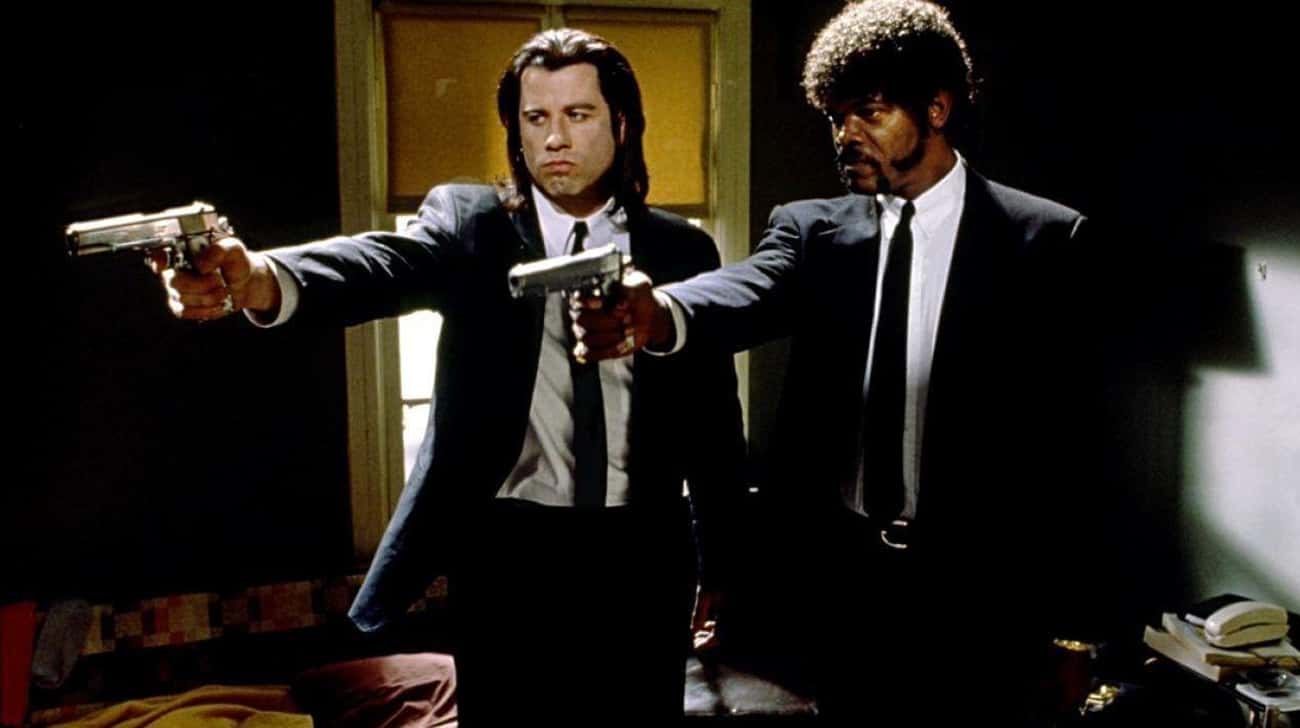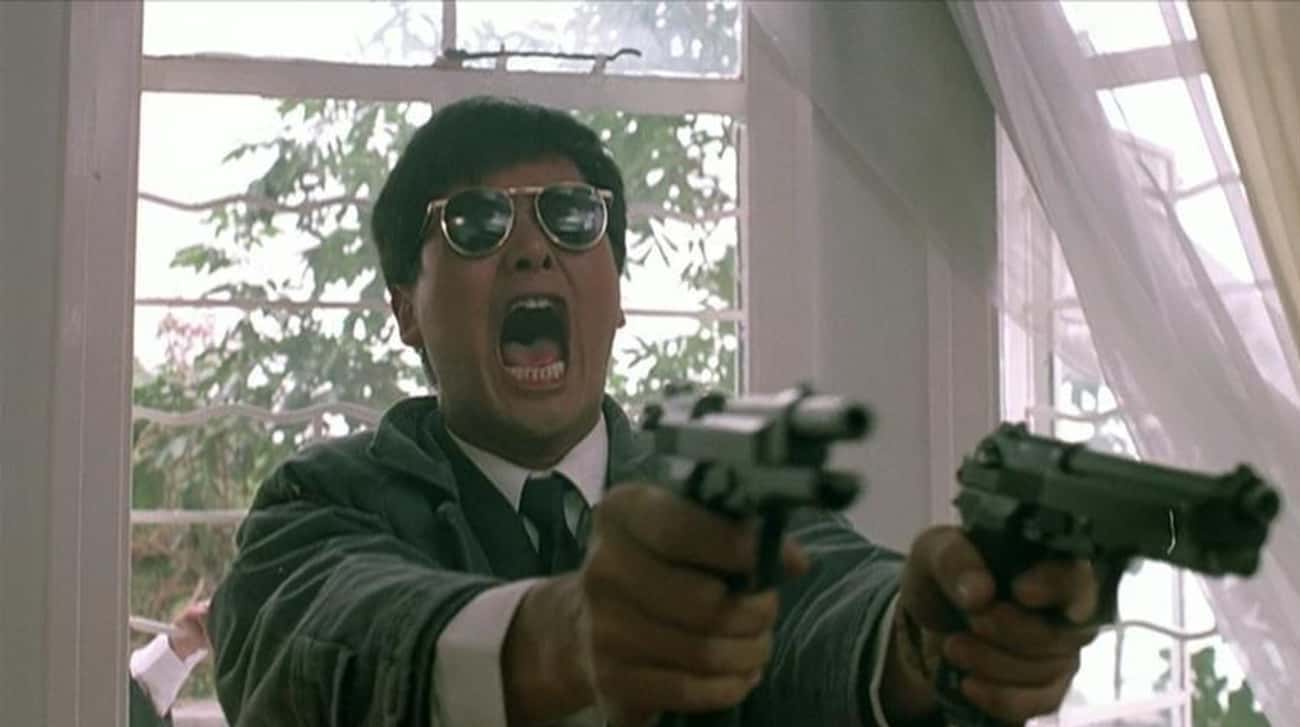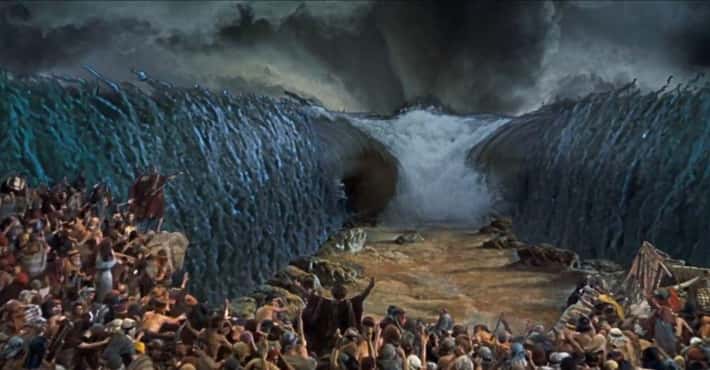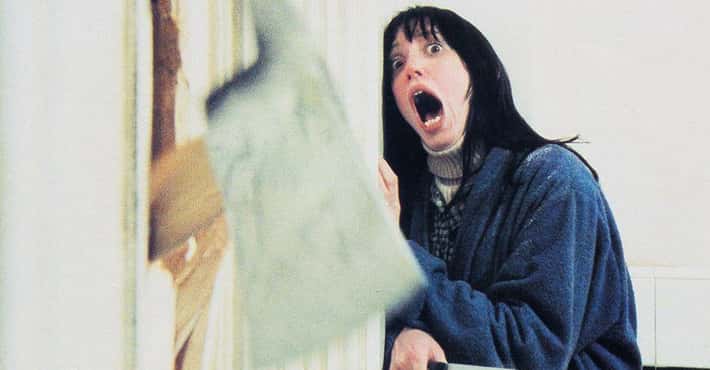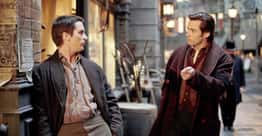The Best Decades For Filmmaking
- 1816 VOTES
1990s
Photo: Miramax FilmsRemember hitting the local video store or Blockbuster in the 1990s on a Friday night? Thankfully, the days of late fees are gone, but the nostalgia will never die. In 1994, Quentin Tarantino changed the landscape of filmmaking with the box office and critical success of Pulp Fiction, proving that independent cinema could marry the best of both worlds - artistry and profits.
Also, Wes Craven launched the rebirth of the slasher film with the meta-funny, really scary Scream, which eventually turned into one of the most profitable horror franchises in cinema history. Meanwhile, in Hong Kong, John Woo exploded the heroic bloodshed genre in the mid-'80s and was reveling in excessive body counts and bullet shells, Jackie Chan and Jet Li brought martial arts cinema to new heights, and Wong Kar-Wai found deep soul in neon-lit streets.
NOTABLE RELEASES:
United States: Goodfellas, Scream, The Big Lebowski, Shakespeare in Love, The Shawshank Redemption, True Romance, Fargo, Seven, Dazed and Confused, Reservoir Dogs, Schindler's List, Three Kings, American Beauty, The Usual Suspects, Being John Malkovich, Titanic, Fight Club, Forrest Gump, The Sixth Sense, Braveheart, Unforgiven, Jurassic Park, Pulp Fiction, Heat, Clerks, Saving Private Ryan, Boogie Nights, The Silence of the Lambs, The Matrix, Philadelphia, Dances with Wolves, Boyz N The Hood, Thelma and Louise, Home Alone, JFK, Sense and Sensibility, Home Alone, Rushmore, The Thin Red Line, Eyes Wide Shut, The Player, Starship Troopers, Magnolia, Terminator 2: Judgment Day, The English Patient, Beauty and the Beast, Malcolm X, Out of Sight
World Cinema: Trainspotting, Princess Mononoke, La Haine, All About My Mother, The City of Lost Children, Run Lola Run, Audition, Lock Stock and Two Smoking Barrels, Chunking Express, Dilwale Dulhania Le Jayenge, Open Your Eyes, Hard Boiled, Funny Games, Police Story 4: First Strike, Life is Beautiful, Three Colors: Red, My Best Fiend , The Full Monty, Drunken Master II, Andaz Apna Apna
UNDERRATED GEMS: Strange Days, Devil In A Blue Dress, Chaplin, Very Bad Things, Twin Peaks: Fire Walk With Me, Gattaca, Beautiful Girls, Six Degrees of Separation, Election, Dark City, The Game, Go, Miller's Crossing, Office Space, A Simple Plan, Zero Effect, Jackie Brown, After Life, Fallen Angels, The Eel, Safe, Ravenous, The Crying Game, El Mariachi
TOP FILM DIRECTORS OF THE 1990s: Quentin Tarantino, Paul Thomas Anderson, Danny Boyle, Wes Craven, Wong Kar-wai, Spike Jonze, David Fincher, The Coen Brothers, David O. Russell, M. Night Shyamalan, Kevin Smith, Alexander Payne, Richard Linklater, James Cameron, Steven Spielberg, John Woo, Jonathan Demme, Robert Zemeckis
- 2731 VOTES
1970s
Photo: ParamountMany consider the 1970s a comeback decade for cinema. Not only did the movies bring in major dollars at the box office, but young directors took artistic risks with sexuality, language, violence, and controversial subject matter. Francis Ford Coppola had one of the great runs in cinema history with two Godfather films, The Conversation, and Apocalypse Now; Woody Allen struck comedic gold with Annie Hall, and gritty crime films like The French Connection and Serpico blurred the lines between good cop/bad cop. VCRs and pay channels like HBO were finding their way into American homes, ultimately changing the way we watched movies.
Meanwhile, in Europe, the literal and metaphorical hangover from the '60s manifested itself in myriad bizarre and fascinating ways, and in Hong Kong, the Shaw Brothers were pumping out countless kung fu classics, changing the way fighting and movement took place on screen. In Mexico, Alejandro Jodorowsky was living in a space not unlike the acid-drenched parallel dimension Coppola visited in Apocalypse Now. Off in Russia, Tarkovsky took advantage of state-employed Soviet film crews to make mind-bending science fiction at a cozily deliberate pace.
NOTABLE RELEASES:
United States: The Godfather, The Godfather II, Annie Hall, One Flew Over the Cukoo's Nest, Cabaret, Apocalypse Now, Rocky, Chinatown, Network, Taxi Driver, American Graffiti, All the President's Men, Manhattan, Star Wars: A New Hope, The Sting, The Exorcist, A Clockwork Orange, Jaws, Alien, Close Encounters of the Third Kind, Dawn of the Dead, Kramer vs. Kramer, Dirty Harry, Grease, The Last Picture Show, Young Frankenstein, The Deer Hunter, Dog Day Afternoon, Halloween, Blazing Saddles, Saturday Night Fever, M*A*S*H, The French Connection, Monty Python and the Holy Grail, American Graffiti, Carrie, Serpico, Deliverance
World Cinema: Stalker, Day For Night, Aguirre: The Wrath of God, Sholay, Le Cercle Rouge, Enter the Dragon, The Discreet Charm of the Bourgeoisie, Amarcord, Solaris, Vengeance Is Mine, The Holy Mountain, Suspiria, Investigation of a Citizen Above Suspicion, Anand, The Conformist, The Five Deadly Venoms, A Touch of Zen, Deewar, The Avenging Eagle, In the Realm of the Senses, The Spirit of the Beehive, A Swedish Love Story, Claire's Knee
UNDERRATED GEMS: Bad Company, The Conversation, Nashville, Duel, Days of Heaven, Barry Lyndon, Harold and Maude, McCabe and Mrs. Miller, A Woman Under the Influence, Straw Dogs, The Jerk, Five Easy Pieces, Badlands, Johnny Got His Gun, Sleuth, The Long Goodbye, Le Boucher
TOP FILM DIRECTORS OF THE 1970s: Luis Buñuel, Sidney Lumet, Stanley Kubrick, Francis Ford Coppola, Andrei Tarkovsky, Alejandro Jodorowsky, Bob Fosse, Roman Polanski, Robert Altman, Woody Allen, William Friedkin, Werner Herzog, Peter Bogdanovich, Steven Spielberg, Mel Brooks
- 3321 VOTES
1960s
Photo: Criterion CollectionAs the Beatles and other rock bands of the British invasion took over the American music charts, foreign arthouse films found their way across the pond. Jean-Luc Godard, Federico Fellini, and Francois Truffaut were just a few of the auteurs who made a name for themselves in America, not to mention a guy called Stanley Kubrick, who found his authorial cinematic voice in the 1960s with Spartacus, Lolita, 2001: A Space Odyssey, and Cold War black comedy Dr. Strangelove: Or, How I Learned to Stop Worrying and Love the Bomb.
The French New Wave, led by friends Godard and Truffaut, changed the way filmmakers made movies by eschewing studios, traditional narratives, and pretty much every other convention of filmmaking you could thing of. For Breathless, Godard made up the script as he went along, shouting lines for actors as they were filming scenes. Just a year earlier, in 1959, Truffaut blew the doors off the film world with The 400 Blows. These were films about films, movies by movie fans, and that self-awareness is directly responsible for the similar device used by Quentin Tarantino and his many acolytes.
On top of that, the great Italians Fellini, Sergio Leone, and Michelangelo Antonioni were whipping up some marvelous dishes while, in Japan, a generation of filmmakers disillusioned by restrictions placed on post-war socialism bred a darkly comedic strain of nihilistic samurai films. Oh yeah, and James Bond kicked off in England.
NOTABLE RELEASES:
United States: The Apartment, Midnight Cowboy, Lawrence of Arabia, Psycho, The Graduate, 2001: A Space Odyssey, Butch Cassidy and the Sundance Kid, To Kill A Mockingbird, Cool Hand Luke, Dr. Strangelove or: How I Learned to Stop Worrying and Love the Bomb, Lolita, Night of the Living Dead, Bonnie and Clyde, Rosemary's Baby, Easy Rider, West Side Story, Mary Poppins, The Man Who Shot Liberty Valance, The Exterminating Angel, The Great Escape, The Sound of Music, Breakfast at Tiffany's, The Wild Bunch, Spartacus, My Fair Lady, The Manchurian Candidate, The Guns of Navarone
World Cinema: La Dolce Vita, 8 ½, Harakiri, Blow Up, Dr. No, Persona, The Good the Bad and the Ugly, Once Upon a Time in the West, Samurai Assassin, Goldfinger, Mughal-e-Azam, L'Avventura, Yojimbo, Shoot the Piano Player, Jules and Jim, Kwaidan, High & Low, Dragon Inn, Cleo from 5 to 7, Le Samouraï, Andrei Rublev, Ivan's Childhood, From Russia with Love, Daisies, Closely Watched Trains, Come Drink with Me, Repulsion, Divorce Italian Style, Double Suicide, The Bad Sleep Well, Thunderball
Godard (because he owned the '60s): Breathless, Contempt, A Woman Is a Woman, My Life to Live, Weekend, A Band of Outsiders, Pierrot le fou, Masculin Féminin, Alphaville, Two or Three Things I Know About Her
UNDERRATED GEMS: The First 25 Zatoichi films, Belle De Jour, Elmer Gantry, Ride the High Country, A Man for All Seasons, Inherit the Wind, Georgy Girl, Darling, Juliet of the Spirits, Fellini Satyricon, The Soft Skin, Red Beard, Pickpocket, Zazie Dans le Metro, Viridiana, Black God White Devil, La Collectionneuse
TOP FILM DIRECTORS OF THE 1960s: Alfred Hitchcock, Stanley Kubrick, Billy Wilder, Federico Fellini, Jean-Luc Godard, Luis Bunuel, Roman Polanski, John Ford, John Frankenheimer, Arthur Penn, Sidney Lumet, John Cassavetes, William Friedkin, Sergio Leone, John Schlesinger, Akira Kurosawa, Sergio Leone
- 4579 VOTES
1980s
Photo: Anchor BaySeveral blockbuster franchises from prestigious directors were born in the '80s, including Indiana Jones with Raiders of the Lost Ark (Spielberg), Back to the Future (Robert Zemeckis), and Ghostbusters (Ivan Reitman). A young director named John Hughes entered the zeitgeist making movies that captured what life was like for bored American teenagers. George Lucas released the second and third installments of his space saga set in a galaxy far, far away.
It was also the era of muscle-bound dudes being huge, slasher films, and a major influx of punk rock influence into the aesthetic and attitude of films. Plus all that glorious dystopian science fiction, thanks to the economic disparity of the Reagan years.
Meanwhile, an underground scene that eventually exploded in the '90s went about slowly creating new ways of making cinema, thanks to the likes of Jim Jarmusch. In Hong Kong, John Woo released A Better Tomorrow, paving a road of double-fisted pistols, trench coats, and sunglasses that ended in The Matrix, and Jackie Chan took on-screen stunts to insane (and nearly lethal) new heights. Over in Japan, a guy you may have heard of called Hayao Miyazaki was doing marvelous things, as anime became high art.
In Europe, filmmakers struggled to define their identity in the fractured Cold War world.
NOTABLE RELEASES:
United States: Raging Bull, Robocop, The Empire Strikes Back, Return of the Jedi, The Princess Bride, Do the Right Thing, Raiders of the Lost Ark, Friday the 13th Part VI: Jason Lives, E.T. the Extra-Terrestrial, Sixteen Candles, Die Hard, Full Metal Jacket, Lethal Weapon, Caddyshack, The Terminator, A Christmas Story, Say Anything, Back to the Future, This Is Spinal Tap, Down By Law, The Big Chill, Platoon, When Harry Met Sally, Predator, Beverly Hills Cop, They Live, The Untouchables, Blade Runner, Ferris Bueller’s Day Off, The Shining, sex, lies & videotape, Blue Velvet, Aliens, Amadeus, Raising Arizona, Ordinary People, Stand By Me, Fast Times At Ridgemont High, Airplane!, Scarface, Ghostbusters, The Breakfast Club, Hannah and Her Sisters, Rain Main, Stranger Than Paradise, First Blood (Rambo), Road House
World Cinema: A Better Tomorrow, Come and See, My Neighbor Toroto, Wings of Desire, Ran, Police Story, Fitzcarraldo, City on Fire, The Decalogue, Paris Texas, Cinema Paradiso, Kiki's Delivery Service, Christiane F, Withnail and I, Akira, The Killer, Kagemusha, Au revoir les enfants, Nausicaä of the Valley of the Wind , The Last Metro, Fanny and Alexander, Grave of the Fireflies, Tampopo, Prison on Fire
UNDERRATED GEMS: Ladyhawke, The King of Comedy, Angel Heart, The Fabulous Baker Boys, A Fish Called Wanda, The Killing Fields, Brazil, The Thing, Once Upon A Time In America, Broadway Danny Rose, Gloria, Pennies From Heaven, Talk Radio, The Return of Godzilla, Total Recall, Repo Man
TOP FILM DIRECTORS OF THE 1980s: John Hughes, Spike Lee, James Cameron, Woody Allen, Oliver Stone, Steven Spielberg, Paul Verhoeven, Hayao Miyazaki, Wim Wenders, John Woo, Robert Zemeckis, Stanley Kubrick, Ridley Scott, David Lynch, Brian De Palma, Rob Reiner, Cameron Crowe, George Lucas, Martin Scorsese
- 5412 VOTES
2000s
Photo: NBC UniversalWatch a movie on your laptop, on your iPad, even on your phone. The world didn't end with Y2K, as the turn of the century made entertainment available at any time. James Cameron finally nailed the whole 3D technology thing with his billion-dollar blockbuster Avatar, war films (Blackhawk Down, In the Valley of Elah, The Hurt Locker) made a comeback post 9/11 and Iraq War, and low budget, torture-filled horror (Saw franchise, Hostel) made a killing at the box office, all of which seemingly reflected the mood of the country.
Meanwhile, American indie directors like Paul Thomas Anderson and Quentin Tarantino increasingly embraced classicist blocking and mis-en-scene with roots in the 1930s, a new generation of indie filmmakers led by the likes of Wes Anderson and Sofia Coppola emerged, an all-time great martial star emerged in Tony Jaa, Wong Kar-Wai found yet more romance mining Hong Kong's past and future, Danny Boyle pushed innovation in digital cinema, South Korean auteurs created new ways of being brutally violent and simultaneously hilarious, and Michael Haeneke quietly went about proving he's one of the best filmmakers in the world.
And, lest you forget, the Three Amigos of Mexico innovated cinematic narrative, visual language, myth-making, and the correlation between violence and pathos in such a way that the total effects of it probably won't be understood until Alfonso Cuaron, Guillermo del Toro, and Alejandro González Iñárritu are willowy haired old men.
NOTABLE RELEASES:
United States: There Will Be Blood, Inglorious Basterds, Ratatouille, Avatar, Eternal Sunshine of the Spotless Mind, Traffic, Memento, No Country For Old Men, Wall-E, Saw, Ocean's 11, A Beautiful Mind, Gladiator, Mulholland Drive, The Departed, The Hurt Locker, Juno, Almost Famous, Minority Report, The Lord of the Rings trilogy, Lost In Translation, The Royal Tenenbaums, The Dark Knight, Kill Bill Vol. 1 & 2, Little Miss Sunshine, Up, Million Dollar Baby, Brokeback Mountain, The Curious Case of Benjamin Button, Grizzly Man, Garden State, Adaptation, Requiem for a Dream, Erin Brockovich
World Cinema: Amelie, Crouching Tiger Hidden Dragon, Snatch, About Elly, Slumdog Millionaire, District 9, A Prophet, 28 Days Later, In The Mood For Love, Old Boy, Spirited Away, Tell No One, The Protector, Millions, The Host, City of God, Heaven, Sympathy for Mr. Vengeance, The White Ribbon, The Piano Teacher, Cache, Code Unknown, The Beat That My Heart Skipped, Memories of Murder, Infernal Affairs, Irreversible, Dancer in the Dark, 4 Months 3 Weeks and 2 Days, Gomorrah, Before Night Falls, The Diving Bell and the Butterfly, Hero, Mother
Three Amigos Films: Y Tu Mama Tambien, Children of Men, Pan's Labyrinth, The Devil's Backbone, Amoresperros, Hellboy, Hellboy II: The Golden Army, 21 Grams, Babel, Blade 2, Harry Potter and the Prisoner of Azkaban
UNDERRATED GEMS: Notre Music, I Heart Huckabees, Kiss Kiss Bang Bang, Brick, Stranger Than Fiction, Bug, Gerry, Rules of Attraction, Laurel Canyon, The Act of Killing, Lymelife, Bubble, Me and You and Everyone We Know, Chop Shop, Silent Light, The Son, Elephant, Whale Rider, The Secret of the Grain, 2046, Exiled, Triad Election
TOP FILM DIRECTORS OF THE 2000s: Christopher Nolan, Quentin Tarantino, The Coen Brothers, Ang Lee, Wes Anderson, Stephen Spielberg, Paul Thomas Anderson, Martin Scorsese, Clint Eastwood, Cameron Crowe, Peter Jackson, Ridley Scott, David Fincher, Guillermo del Toro, Ron Howard, James Cameron, David Lynch, Kathryn Bigelow Gus Van Sant, Steven Soderbergh, Alfonso Cuaron, Michael Haeneke, Wong Kar-Wai, Johnnie To
- 6294 VOTES
1950s
Photo: Criterion CollectionHollywood responded to the relieved but defeated post-war world of the 1950s by creating complex films about conflicted youth, damaged war vets, and an uncertain world and, on the opposite end of the spectrum, banal musicals, absurd historical spectacles, and heroic battle films. The disgruntled youth rebellion led by cool icons such as James Dean and Marlon Brando brought a new vision to young people around the country. American cinema also found the power of rock n' roll and in 1955 Blackboard Jungle became the first Hollywood movie to use music's hottest new trend on its soundtrack.
Abroad, Italian Neorealism forged ahead. Ingmar Bergman was laying groundwork for the surreal imagery and esoteric metaphors Kubrick loved so much, while in Japan, Akira Kurosawa changed action cinema forever - without him you can kiss Lucas, Coppola, Spielberg, and Scorsese goodbye. Meanwhile, in France, the New Wave officially kicked off with The 400 Blows.
NOTABLE RELEASES:
United States: The Searchers, Rear Window, An American in Paris, Sabrina, On the Waterfront, Bridge on the River Kwai, Night by Northwest, Rebel without a Cause, Sunset Blvd., Ben-Hur, The Searchers, Vertigo, Singing in the Rain, 12 Angry Men, High Noon, The Ten Commandments, The Wild One, The Big Heat, Dial M for Murder, Some Like It Hot, Touch of Evil, Shane, Strangers on a Train, The African Queen, From Here to Eternity, In a Lonely Place, East of Eden, The Asphalt Jungle, Giant, Shane, Limelight, A Streetcar Named Desire, Blackboard Jungle, Seven Year Itch, Gigi, A Place in the Sun
World Cinema: Satyajit Ray's Apu trilogy, The Seventh Seal, The 400 Blows, Black Orpheus, Wild Strawberries, Hiroshima Mon Amour, Ugetsu, Tokyo Story, La Strada, Rififi, Gojira, The Cranes Are Flying, Nights of Cabiria, The Human Condition Parts 1 & 2, I Vitelloni, The Lady Killers, Elevator to the Gallows, Stromboli, Bellissima, The Lavender Hill Mob, Gate of Hell, The Wages of Fear, The Bridge, Los Olvidados, Machine to Kill Bad People
Akira Kurosawa: Rashomon, Scandal, Ikiru, The Idiot, Seven Samurai, Record of a Living Being, Throne of Blood, The Lower Depths, The Hidden Fortress
UNDERRATED GEMS: The Night of the Hunter, Ace in the Hole, Marty, All That Heaven Allows, Johnny Guitar, D.O.A., Gunfight, Suddenly, Salt of the Earth, Ride Lonesome, The Narrow Margin
TOP FILM DIRECTORS OF THE 1950s: Billy Wilder, Akira Kurosawa, Federico Fellini, Alfred Hitchcock, Fred Zinnemann, Nicholas Ray, John Ford, Fritz Lang, Elia Kazan, John Huston, George Stevens, John Ford, Orson Welles
- 7318 VOTES
1940s
Photo: Warner Bros.War films marked the first half of the 1940s, as the entire filmmaking world was engulfed in War War II. The 1940s started off sluggishly at the box office (people had other things to worry about and millions of people were overseas fighting), but by the middle part of the decade, technological advancements like color and special effects brought a much-needed dose of modernity to the cinema. The period saw the rise of film noir, as seedy characters and dark overtones reflected the bleak war time mood of the nation.
Abroad, Italians changed the way cinema works with Neorealism, a movement that had such a profound effect on cinema it has been equated with the medium itself, inseparable from the most basic definition of what we understand film to be. In Japan, Akira Kurosawa got his start.
NOTABLE RELEASES:
United States: Casablanca, The Maltese Falcon, Double Indemnity, Citizen Kane, The Treasure of the Sierra Madre, Gaslight, Rebecca, The Philadelphia Story, The Red Shoes, Notorious, It's a Wonderful Life, The Big Sleep, Meet Me In St. Louis, His Girl Friday, The Killers, The Great Dictator, Shadow of a Doubt, Laura, The Best Years of Our Lives, The Grapes of Wrath, Key Largo, Red River, Fantasia, Miracle on 34th Street, Arsenic and Old Lace, Mildred Pierce
World Cinema: Children of Paradise, The Third Man, The Bicycle Thieves, Kind Hearts and Coronets, Rome: Open City, Stray Dog, Ivan the Terrible Part I, Day of Wrath, Germany Year Zero, Drunken Angel, Quai des Orfèvres, Late Spring, Beauty and the Beast, The Silence of the Sea, Jour de fête
UNDERRATED GEMS: Out of the Past, The Uninvited, Black Narcissus, Rope, The Magnificent Ambersons, Day of Wrath, Letter From an Unknown Woman, There Was a Father
TOP FILM DIRECTORS OF THE 1950s: Orson Welles, Alfred Hitchcock, Howard Hawks, Frank Capra, Billy Wilder, John Huston, Michael Powell, Vittorio De Sica, George Cukor, Charlie Chaplin, Otto Preminger, Vincente Minnelli, William Wyler, Michael Curtiz, Akira Kurosawa, Roberto Rosselini
- 8232 VOTES
1930s
Photo: Universal StudiosThe bulk of the 1930s is often labeled The Golden Age of Hollywood. Talkies dominated the landscape, and more and more films throughout the decade were made with color. The establishment of film genres also emerged as audiences seemed to favor the rule-bound world established by a western, horror, or screwball comedy.
The establishment of the Hayes Code in 1930 set a rigid standard of censorship of language, sex, and violence in American cinema. One of the first films to challenge the Hayes Code, Gone with the Wind, with its use of the word "damn," gained notoriety and huge box office receipts in part for defying the code.
Meanwhile, in France, Jean Renoir and Marcel Carne trafficked in humanism and romance, which Renoir undercut with hiw scathing social satire The Rules of the Game. In Germany, the Nazis helped redefine the language of cinema as propaganda through films like Triumph of the Will, yet at the beginning of the decade, some great films shot out of the death rattle of Weimar Expressionism.
NOTABLE RELEASES:
United States: Gone with the Wind, Ninotchka, The Wizard of Oz, Dracula, Duck Soup, City Lights, It Happened One Night, Trouble in Paradise, Mr. Smith Goes to Washington, Scarface, The Shame of a Nation, Modern Times, The Rules of the Game, Frankestein, Bride of Frankenstein, Bringing Up Baby, King Kong, Hell's Angels, Design for Living, Snow White and the Seven Dwarfs, The Adventures of Robin Hood, Stagecoach, All Quiet on the Western Front, Top Hat, The Thin Man, You Can't Take It With You, Animal Crackers, Young Mr. Lincoln, City Girl, Holiday, Tom Sawyer, Shanghai Express
World Cinema: The Rules of the Game, The Grand Illusion, October: Ten Days That Shook the World, Earth, The Story of the Last Chrysanthemum, Boudu Saved from Drowning, L’age d’Or, Alexander Nevsky, The Blue Angel, M, Triumph of the Will, Vampyr, Kuhle Wampe, Olympia Parts I & II, L'Atalante, Le Million, La Chienne, Daybreak, Pepe Le Moko, ¡Que Viva Mexico!, A Day in the Country
UNDERRATED GEMS: Freaks, The Lady Vanishes, The Only Son, Our Neighbor, Miss Yae, People on Sunday
TOP FILM DIRECTORS OF THE 1930s: John Ford, Charlie Chaplin, Ernst Lubitsch, Jean Renoir, Howard Hawks, Marcel Carne, Alfred Hitchcock, Victor Fleming, Frank Capra, Fritz Lang, Cecil B. DeMille, George Cukor, John Cromwell, W. S. Van Dyke, Sergei Eisenstein, Leni Riefenstahl
- 9355 VOTES
2010s
Photo: Weinstein CompanyWhat's a DVD? As the demand for DVD sales hits an all-time low, and with movie theater attendance down, the film industry looked to on-demand and streaming services like Netflix and social media to reach consumers, while sequels and remakes rule the box office and interconnected universes such as Marvel and Star Wars pump out episodes in emulation of the supposed Golden Age of Television.
Meanwhile, around the world, relatively inexpensive digital technology has allowed filmmakers to create relatively epic (emotionally, if not in physical scope) films on previously unthinkable budgets. The physically liberating nature of digital technology - you really can put the camera right in someone's face and move it wherever you want, whenever you want, plus you never have to stop to reload film - radically changed cinema, giving rise to a new era in intimacy and flexibility, of which filmmakers from David O Russell to Jacques Audiard have made tremendous use.
NOTABLE RELEASES:
United States: Fruitvale Station, The Grand Budapest Hotel, The Social Network, Logan, Django Unchained, The Wolf of Wall Street, Prisoners, Mad Max: Fury Road, Zero Dark Thirty, Drive, Silver Linings Playbook, Sicario, 12 Years a Slave, Argo, Boyhood, The Fighter, Birdman, Spotlight, Moonlight, The Tree of Life, The Avengers, Guardians of the Galaxy, Deadpool, Her, Inception, The Girl with the Dragon Tattoo, Toy Story 3, Rogue One, Whiplash, La La Land, Inside Out, Gone Girl, The Martian, The Revenant, Black Swan, Gravity, Frozen, Manchester by the Sea, Hugo, Kick-Ass, Nebraska, A Most Violent Year, Nightcrawler
World Cinema: Blue Is the Warmest Color, A Separation, Rust and Bone, Goodbye to Language, No, Holy Motors, The Great Beauty, Amour, Two Days One Night, The Man From Nowhere, Victoria, Enter the Void, White God, The Raid, Kill Zone 2, Son of Saul, Wetlands, The Gangs of Wasseypur, Let the Bullets Fly, Tambien La Lluvia, T2: Trainspotting, Dheepan, Biutiful, I Saw the Devil, Under the Skin, Force Majeure, Leviathan, Snowpiercer
UNDERRATED GEMS: Anomalisa, Take This Waltz, ID (India), The Riot Club, Four Lions, Buried, Tiny Furniture, Bang Gang, Exit Through the Gift Shop, Kill List, Sing Street, Don't Look Back, Compliance, Love & Mercy, Frances Ha, Chappie, The End of the Tour, Me and Earl and the Dying Girl, Source Code, The Skeleton Twins, Eye in the Sky, The Cloud Atlas, The Perks of Being a Wallflower, 99 Homes, All Is Lost
TOP FILM DIRECTORS OF THE 2010s: Alfonso Cuarón, David Fincher, Asghar Farhadi, Ryan Coogler, David O Russell, Jacques Audiard, Wes Anderson, The Coen Brothers, J.J. Abrams, Martin Scorsese, Ben Affleck, Danny Boyle, Christopher Nolan, Darren Aronofsky, Nicolas Winding Refn, Damien Chazelle, Richard Linklater, Quentin Tarantino, Terrence Malick, Spike Jonze
- 10203 VOTES
1920s
Photo: CreateSpaceThe Studio system was born in the 1920s. By the middle part of the decade, movies were one of the biggest business around, especially in Los Angeles. The first half of the 1920s was all silent films. The Jazz Singer changed the game in 1927. It was the first feature-length movie with a synchronized recorded music score and also lip synch singing and speech.
By the end of the decade, there were already 20 Hollywood movie studios. By 1929, the major studios were established, which became known as "The Big Five." Those five majors produced more than 90 percent of all fiction films made in the United States. American audiences could not get enough of the movies, Hollywood studios made about 800 films a year in the 1920s, as opposed to the roughly 500 made today.
Meanwhile, in the Weimar Republic (Germany), directors like Fritz Lang, F.W. Murnau, and Robert Weiner were combining cinematic narrative with avant garde forms of visual art to essentially define what is now known as arthouse cinema. The importance of these filmmakers, and the German Expressionist movement, to the history of cinema is impossible to over estimate. As the Germans broke ground in countless ways, Sergie Eisenstein redefined editing in Russia.
NOTABLE RELEASES:
United States: Ben-Hur, The Jazz Singer, Greed, The Four Horsemen of the Apocalypse, The Ten Commandments The Last Laugh, The Crowd, Man with the Movie Camera, Our Hospitality, Sunrise: A Song of Two Humans, The Kid, The Phantom of the Opera, The General, The Gold Rush
World Cinema: Battleship Potemkin, Metropolis, The Cabinet of Dr. Caligari, Un Chien Andalou, The Passion of Joan of Arc, Nosferatu, The Golem, Coeur Fidele, The Last Laugh, Dr. Mabuse the Gambler, Faust, From Morn to Midnight, Asphalt, The Student of Prague, Pandora’s Box, L'Argent, Master of the House, Napoleon, Strike, The Phantom Carriage, La Femme de nulle part
UNDERRATED GEMS: The Freshman, The Unknown, The Love Parade, Applause, The Fall of the House of Usher,
TOP FILM DIRECTORS OF THE 1920s: Fritz Lang, Robert Wiener, F.W. Murnau, Charlie Chaplin, Buster Keaton, Sergei Eisenstein, Carl Theodor Dreyer, Dziga Vertov, Cecil B. DeMille, D.W. Griffith


